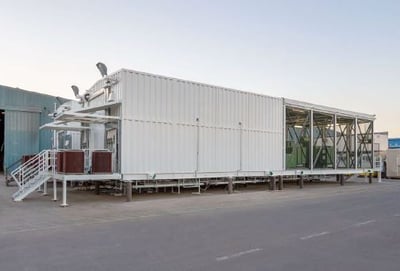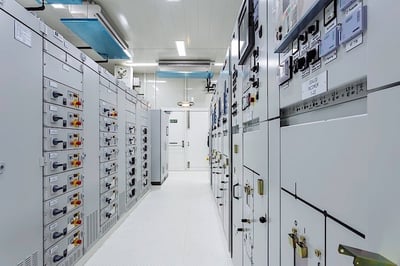When it comes to deciding whether to use a modular technical building or a traditional stick build, there are a lot of elements to consider. Location, budget, timeline, and more all play a factor in deciding what type of technical building you select.
 Modular buildings have become increasingly popular for technical building construction across a wide range of industries. The following is a breakdown of the key advantages of going modular and why you should consider this type of construction for your next technical building.
Modular buildings have become increasingly popular for technical building construction across a wide range of industries. The following is a breakdown of the key advantages of going modular and why you should consider this type of construction for your next technical building.
What is a technical building?
There are many different types of technical buildings. Technical buildings are used to house and protect equipment located in hazardous environments. They are used across a wide range of industries for electrical power equipment, control equipment, motors, instrumentation, and more.
How are traditional (stick built) technical buildings constructed?
Traditional, or stick built, technical buildings are constructed through conventional means, the same way a house is built. At the location, a foundation is built to provide a base for the building. Then various contractors are brought onsite to begin building.
They frame it, wire it, plumb it, install the necessary equipment the building is housing, and test it onsite. With this type of construction, the progress is at the mercy of the weather and the contractor's ability to get to the location. Given that technical buildings are used in a variety of locations and hazardous environments, there is a greater level of complexity in making sure the construction stays in budget and on the production timeline.
How are modular technical buildings constructed?
Modular technical buildings have some construction processes that are similar to traditional buildings, but they differ in distinct ways. Like a traditional building, a foundation is laid at the location on which the building will be placed. Unlike traditional construction, the building is constructed at a facility in modules that are self-supporting. The modules are then transported to the location and installed on the foundation like the traditional building.
Why choose a Modular over a Stick Built Technical Building?
If you still need to have a foundation and install the building onsite, why would you choose to go with a modular technical building over a traditional stick-built one? The answer to that comes from the modular building's method of construction. By putting the structure together at an off-site facility, the builder maximizes efficiencies. These efficiencies enable a lower cost of construction, increased quality, and improved safety throughout the build process.
Modular Technical Buildings Are Cost-Effective
There are several ways in which a modular building can be a more cost-effective way to build a technical building for a remote location:
Reduced Labor Costs – Because modular buildings are constructed in a controlled shop environment, the overall total working hours required to construct a building is reduced. Reductions are achieved in a few different ways.
The first being the manufacturer does not have to pay per diems, mileage, or lodging for the entirety of the project as they would to build on location.
Secondly, modular building manufacturers generally staff the necessary workforce to be able to construct and integrate the buildings they make. Using their staff allows them to reduce the need for expensive third-party contractors.
Lastly, working in a shop environment provides for a process to be put in place that reduces the time it takes to construct the building, thereby reducing the cost.
2. Procurement of Materials – The manufacturer handles the procurement of the building materials. Managing the procurement removes the need for the client to dedicate procurement and logistics personnel to this particular equipment. Also, the manufacturer's facility is experienced in building this type of equipment, so they have the right contacts to procure the items necessary to fabricate the technical building, reducing the overall cost of the materials.
3. Shorter Construction Schedule – In addition to the cost reduction, a short construction schedule is obtained from reduced man-hours for a project. The shorter construction schedule enables the client to get their building up and running quicker, allowing for the building to be installed quickly and without interruptions.Modular Technical Buildings Are Higher Quality
The modular building process enables manufacturers to produce higher quality buildings than can be achieved in the traditional building process.
 Knowledgeable Personnel – The manufacturer will staff the necessary personnel to perform the integration of all instrumentation, electrical equipment, and components required to construct the module. The fabricator will typically hire personnel with a greater level of experience in integrating the electrical, instrumentation, and other items within the technical building. This produces a higher quality of work and cost savings.
Knowledgeable Personnel – The manufacturer will staff the necessary personnel to perform the integration of all instrumentation, electrical equipment, and components required to construct the module. The fabricator will typically hire personnel with a greater level of experience in integrating the electrical, instrumentation, and other items within the technical building. This produces a higher quality of work and cost savings.
Testing – Factory acceptance testing, as well as any other testing required by the client, is performed at the manufacturer's facility, ensuring that all equipment and instrumentation is functioning and operating at its designed specifications. Testing at the facility enables the manufacturer to find and correct any issues that there might be before the technical building is installed onsite. This ensures that when the building arrives at the location, there won't be any delays in bringing it online.
Increased Safety – Having knowledgeable and experienced personnel involved in the design and construction of the technical building helps ensure that all necessary safety protocols are accounted for and followed. In addition, working within the controlled environment of the manufacturer's facility allows for procedures to be put in place, increasing adherence to the safety protocols.
Modular technical buildings are cost-effective and of a higher quality than traditional stick builds. These key advantages are the leading factors for the increase in the use of modular buildings today.
If you have any questions about whether a modular building would be right for you, just ask. The team at Armoda has designed and built modular technical buildings for a wide range of industries and can help you get your next project started.
